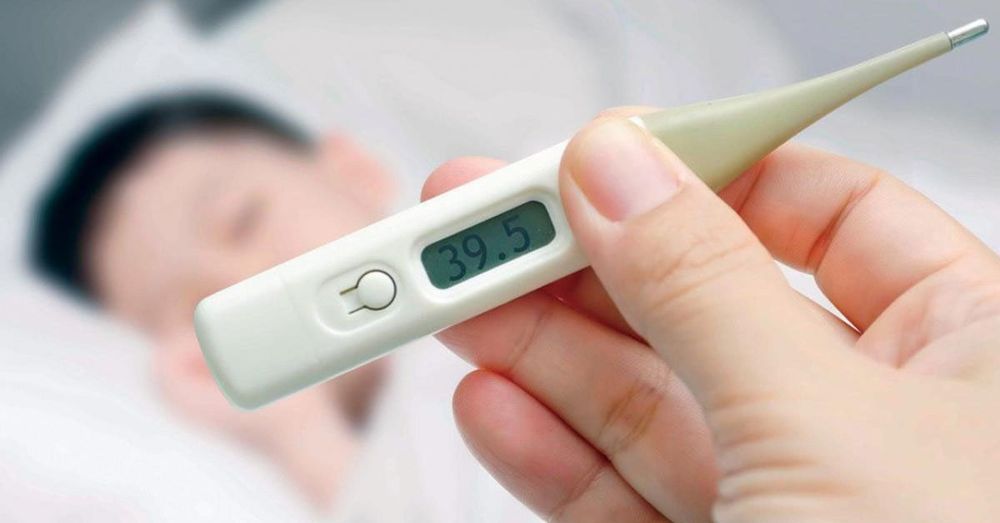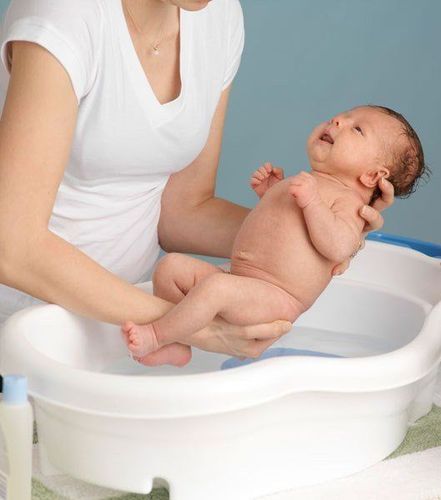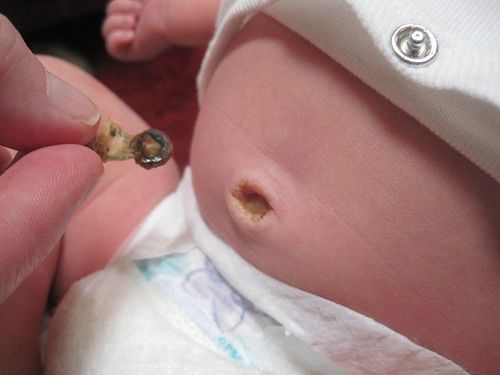This is an automatically translated article.
The article was professionally consulted by Specialist Doctor II Cao Thi Thanh - Pediatrician - Department of Pediatrics - Neonatology - Vinmec Hai Phong International General Hospital. Dr. Thanh has worked for 25 years in the treatment of neonatal pediatric diseases.Caring for a newborn can be challenging for many first-time parents. Caring for a normal healthy newborn will be very different from that of a baby with signs or symptoms of illness. So, how will the newborn be cared for and in what cases should a doctor be seen?
1. Newborn Care
When caring for a newborn, careful attention should be paid to the following:1.1 Feeding It is very important to feed your baby on time. A newborn baby must be fed regularly every 2 to 3 hours. Newborns should be breastfed for the first 6 months. Breast milk contains important nutrients and antibodies needed for your baby's life and growth.
In case the mother does not have milk, she can refer to the formula recommended by the doctor. Babies should get 60 to 90ml of formula per feeding.
1.2 Ợ swallow food After your baby is fed, he or she needs to be burped. Because, during feeding, babies often swallow air which causes colic. The burping of food removes this excess air, aiding digestion and preventing colic.
You can do this by gently holding your baby against your chest with one hand, his chin resting on your shoulder, then pat or stroke his back very gently with the other hand until baby burp.
1.3 How to hold a newborn You must make sure that you are supporting the baby's head and neck with one hand while holding the baby. This is because your baby's neck muscles aren't strong enough to hold their head yet. The backbone is also still growing and getting stronger. The neck can support itself after only 3 months of age. So, pay attention to supporting your baby's head and neck while caring for a newborn.
1.4 Care of the umbilical cord Another important aspect of taking care of a newborn baby in the first month is taking care of the umbilical cord. Shower 2-6 hours after giving birth with warm water and keep the navel area clean and dry.
Disinfect hands before handling the navel area. To clean, use a cloth soaked in alcohol of the right concentration for cleaning the navel. Look for signs of infection in the umbilical cord area. If there is redness, swelling, discharge or pus and bleeding in the navel area, take your baby to the pediatrician.
1.5 Changing Baby Diapers Frequent diaper changes are an important part of newborn care. If your baby is getting enough breast milk or formula, he or she will probably wet at least 6 to 8 diapers in a day. For diaper changes that won't hurt your baby's tender skin, you'll need a changing pad, a soft damp cloth, diaper rash cream, and a clean diaper.
1.6 Baby Bathing Newborn bathing requires subtlety. Baby baths are usually done 2-6 hours after birth in healthy newborns weighing more than 2500 g. However, bathing may be delayed in some situations such as winter.

Tắm cho trẻ
To perform a baby bath, you will need an infant bath, warm water, mild soap or body wash, washcloths, soft towels, lotion or cream, new diapers and baby clothes. Get a partner or family member to help, so that one person can hold the baby's neck and head above the water while the other bathes. Clean the genitals, scalp, hair, neck, face, and any dry mucus collected around the nose with a washcloth. Wash your baby's body with warm water. After bathing, dry your baby's body with a soft towel, apply lotion, and put on new diapers and baby clothes.
1.7 Baby massage Massage helps the baby sleep easily, improves blood circulation, digestive system. During the massage, apply a small amount of massage oil or lotion to the hands. Next, gently and rhythmically stroke your baby's body. A good time to massage your baby is before a bath.
1.8 Baby Sleep Mode Newborns need about 16 hours of sleep a day for the first 2 months. They usually nap for 2 to 4 hours and wake up if hungry or wet. Since your baby needs to be fed every 3 hours, you may need to wake him up and feed him.
You should also not worry too much in case your baby does not follow the ideal infant sleep pattern. Every baby is different and has different sleep cycles.
You should also remember to change the position of your baby's head while he is sleeping. This helps the skull to grow evenly, avoiding "head flattening".
1.9 Baby Nail Trimming Newborn nails grow very quickly. Babies can scratch their own face or body with hand movements. Therefore, it is recommended to trim the baby's nails to limit the baby's self-injury.
Try and trim nails gently while baby sleeps. Do not cut too deep as the nails are very soft and can cause pain for the baby. Do not trim the edges of the nail as this will cause an ingrown nail.
2. Situations that require a doctor to take care of a newborn
If you detect some of the following signs, call your doctor for advice and appropriate child care to minimize those symptoms.2.1 Dehydration Signs that an infant is not getting enough fluids include:
Less than three wet diapers a day Acting excessively sleepy or lethargic Dry mouth and lips Difficult problems Not having a bowel movement for 48 first hour at home White mucus in stool Red streaks or streaks, a sign of blood in stool 2.2 High or low temperature Rectal temperature or body temperature higher than 38.0 degrees Celsius or lower than 36 degrees Celsius.

Theo dõi biến đổi nhiệt độ của trẻ
Grumping, persistent crying that can last longer than half an hour Nose problems Chest retraction (retraction in the area) skin above the collarbone, between the ribs, or below the ribs) Rapid breathing Heavy, noisy breathing (wheezing, whistling, or high-pitched sounds when inhaling and exhaling) 2.4 Umbilical cord problems Persistent odor, pus, or bleeding from the umbilical cord Redness or swelling around the navel, which could be a sign of an infection 2.5 Jaundice 2.6 Lots of sleep (Tired)
A sleepy baby doesn't wake up for a feed three or four hours after the last feed. Some signs of illness include:
Cough, diarrhea or paleness Vomiting stronger than two consecutive feedings 2.7 Eating poorly or sucking less Feeding less than six times in a 24-hour period Feeding less than usual Taking care of a newborn is not easy, if you see any abnormal signs, take your baby to a reputable medical facility for timely examination and treatment.
To prevent diseases that babies often get, parents should pay attention to nutrition to improve children's resistance. At the same time, add supporting foods containing lysine, essential micro-minerals and vitamins such as zinc, chromium, selenium, B vitamins,... snacks and less digestive problems.
Parents can learn more:
Why do you need to supplement Lysine for your baby?
The role of zinc - Guidelines for reasonable zinc supplementation
Please visit the website Vinmec.com regularly and update useful information to take care of your baby and family.
Reference source: babycenter.com














